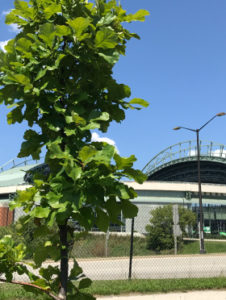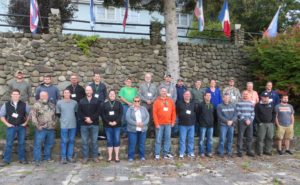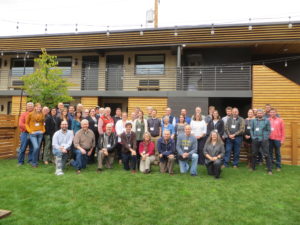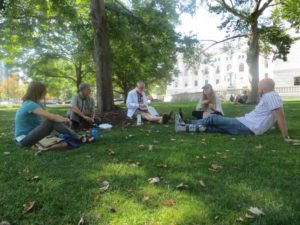 Trust is easy to find in a job you love, since it is what our relationships are built on. In our urban forestry program, much of our work depends on having trusting relationships. Here is an example of a project to illustrate the importance of trust. Continue reading “Trust – a way of business in urban forestry”
Trust is easy to find in a job you love, since it is what our relationships are built on. In our urban forestry program, much of our work depends on having trusting relationships. Here is an example of a project to illustrate the importance of trust. Continue reading “Trust – a way of business in urban forestry”
Urban Forestry News
Community Tree Management Institute was a success
 The first of three sessions was held for Wisconsin’s Community Tree Management Institute (CTMI). Twenty-six students from across the state met in Green Lake, WI October 17-18. These municipal tree managers (who lack technical and program management in arboriculture) learned the foundations of urban forestry. Through hands-on training and exercises, students learned about: canopy and measurement tools, tree benefits, awareness and support, politics and policy, leadership, partnerships, legal issues, ordinances, budgeting, tree boards and utilities. Instructors for session I included: municipal foresters, public works directors, a UW Extension agent, utility representatives, consultants and DNR staff. The variety of instructors, their perspectives and interactive components is meant to appeal to all learning styles. Continue reading “Community Tree Management Institute was a success”
The first of three sessions was held for Wisconsin’s Community Tree Management Institute (CTMI). Twenty-six students from across the state met in Green Lake, WI October 17-18. These municipal tree managers (who lack technical and program management in arboriculture) learned the foundations of urban forestry. Through hands-on training and exercises, students learned about: canopy and measurement tools, tree benefits, awareness and support, politics and policy, leadership, partnerships, legal issues, ordinances, budgeting, tree boards and utilities. Instructors for session I included: municipal foresters, public works directors, a UW Extension agent, utility representatives, consultants and DNR staff. The variety of instructors, their perspectives and interactive components is meant to appeal to all learning styles. Continue reading “Community Tree Management Institute was a success”
Making room for sustainable sourcing
By Dwayne Sperber, owner, Wudeward Urban Forest Products and appointed member, Wisconsin Urban Forestry Council
When a company has publicly committed to corporate social responsibility, environmental conservation, or working with and through the local community, a new construction project is the time to put these philosophies into action. Unfortunately, this is easier said than done.
Designs may get drawn up with the best sustainably-minded intentions — locally-sourced, low emissions, recycled, reused, energy efficient, the list goes on. But as familiar as the design and construction industries are with using environmentally-friendly materials, most of these products do not come in standard sizes, colors or volumes. And they don’t always fit seamlessly into a standard construction management process. Continue reading “Making room for sustainable sourcing”
Wisconsin Urban Forestry Council meeting
 The Urban Forestry Council held their most recent quarterly meeting on October 13 at The Oxbow Hotel in Eau Claire. This was the second time the Wisconsin Council met with their colleagues in Minnesota, board members from the Minnesota Shade Tree Advisory Committee and MN DNR urban forestry staff. In addition, they were joined by Urban Forestry Council members from several additional states: Indiana, Iowa, and Michigan. The Wisconsin Urban Forestry Council and Wisconsin DNR were pleased to welcome these urban forestry representatives from the region for the meeting. Continue reading “Wisconsin Urban Forestry Council meeting”
The Urban Forestry Council held their most recent quarterly meeting on October 13 at The Oxbow Hotel in Eau Claire. This was the second time the Wisconsin Council met with their colleagues in Minnesota, board members from the Minnesota Shade Tree Advisory Committee and MN DNR urban forestry staff. In addition, they were joined by Urban Forestry Council members from several additional states: Indiana, Iowa, and Michigan. The Wisconsin Urban Forestry Council and Wisconsin DNR were pleased to welcome these urban forestry representatives from the region for the meeting. Continue reading “Wisconsin Urban Forestry Council meeting”
Healthcare facilities using green spaces to help in healing
Imagine taking a relaxing walk in a wooded area, listening to the sounds of wind through trees, birds, and water running down a stream and seeing beautiful, vibrant shade of green. This type of an environment has shown numerous benefits, from cleaner air and water to increased health benefits like reduced stress and blood pressure. Continue reading “Healthcare facilities using green spaces to help in healing”
2017 Urban and Community Forestry Questionaire
This month, nearly 700 communities across the state will receive a request in the mail to complete a questionnaire for an important project to determine the current management of community tree populations in Wisconsin. The study is being jointly conducted and sponsored by the University of Wisconsin – Stevens Point, the Wisconsin Department of Natural Resources Urban & Community Forestry Program, and the USDA Forest Service. It serves to provide important information for the state program since the last community survey in 2008 and as a student project at UW – Stevens Point.
Continue reading “2017 Urban and Community Forestry Questionaire”
Hoppe Tree Service partners with Brown Deer High School to utilize urban wood
This fall semester, students at Brown Deer High School won’t have to worry about whether or not they have enough lumber supplies and project ideas to perform during their Industrial Arts Wood Shop classes. This is thanks to a partnership between the school and Hoppe Tree Service. The partnership centers around the concept of using locally sourced urban wood from Hoppe Tree Service’s Urban Wood Lab Store. The agreement not only provides lumber for the school, but also allows the student’s non-profit “business” to earn money by processing wood and creating crafts that Hoppe’s Urban Wood Lab Store can then sell to consumers. Continue reading “Hoppe Tree Service partners with Brown Deer High School to utilize urban wood”
Conversations about the Wisconsin Community Tree Map
The following article was written by Elizabeth Dierickx, Marketing Specialist at Plan-It Geo, LLC, based on conversations she has had with DNR staff members.
I recently had the pleasure of sitting down with Dan Buckler, DNR Urban Forest Assessment Specialist and Laura Lorentz, DNR Urban Forestry Policy & Partnership Specialist to talk about Wisconsin’s new Community Tree Map. This exciting tool has brought a lot of new excitement and opportunity to the states community forests; the Community Tree Map has the potential to assists the urban forestry team in developing policies based on data driven analysis, has given them a better tool to make recommendations, and helped to create awareness about the urban forest with community members and decision makers. Continue reading “Conversations about the Wisconsin Community Tree Map”
Minnesota DNR Urban Forestry visits Wisconsin
 The Urban Forestry team hosted Valerie McClannahan from the Minnesota DNR on September 25th and 26th. Valerie was particularly interested in our Urban Forest Assessment program, the urban wood industry in Wisconsin, and general programmatic items. During her visit, we highlighted the Wisconsin Community Tree Map and the Capital Park inventory, our UFIA program, our canopy assessment project, and the urban homeowner survey. She is interested in how Minnesota can leverage some of their existing work and incorporate some of the additional pieces we are developing for statewide assessments. Continue reading “Minnesota DNR Urban Forestry visits Wisconsin”
The Urban Forestry team hosted Valerie McClannahan from the Minnesota DNR on September 25th and 26th. Valerie was particularly interested in our Urban Forest Assessment program, the urban wood industry in Wisconsin, and general programmatic items. During her visit, we highlighted the Wisconsin Community Tree Map and the Capital Park inventory, our UFIA program, our canopy assessment project, and the urban homeowner survey. She is interested in how Minnesota can leverage some of their existing work and incorporate some of the additional pieces we are developing for statewide assessments. Continue reading “Minnesota DNR Urban Forestry visits Wisconsin”
UW Forestry students visit DNR
 On Wednesday, October 4th UW-Madison students from the Forestry program visited the DNR. About 16 students attended an informational session on the Division of Forestry which highlighted a few of our programs. Continue reading “UW Forestry students visit DNR”
On Wednesday, October 4th UW-Madison students from the Forestry program visited the DNR. About 16 students attended an informational session on the Division of Forestry which highlighted a few of our programs. Continue reading “UW Forestry students visit DNR”
